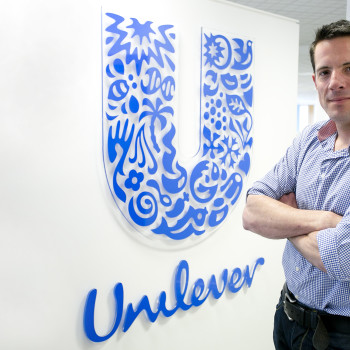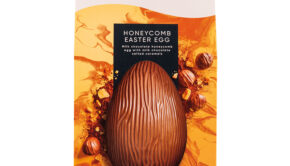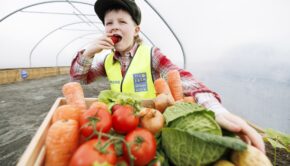The face behind the brands

Fionnuala Carolan meets Nick Johnson, managing director of Unilever Ireland to hear of his ambitious plans to keep Unilever at the top of the food chain, literally
15 May 2015
Nick Johnson is the managing director for Unilever Ireland, taking up the reins in June 2014. Prior to this role, Johnson was the director of shopper marketing and category management with Unilever UK and has been with the company since 2011.
Despite his relatively new role, he is well settled in and has already overseen some exciting new initiatives. He says it has been interesting getting to know the business here and discovering what he terms as “unexploited growth opportunities”.
Based in Unilever Ireland’s head office in Citywest, Johnson is responsible for the company’s business development in Ireland, working in close partnership with the company’s retail and wholesale customers. Part of his initiation was meeting with the company’s retail partners here and understanding the dynamics of the business in this new environment.
Unilever performed very well in the second half of last year and it has seen a strong start to 2015, with some extremely successful activity such as Persil’s Sports Kits for School promotion and the New Magnum Pink and Black launch.
Making the move
As a native of Co. Derry, Johnson was happy with the move into the Irish business. “I’ve really enjoyed the move,” he says. “I’m from Coleraine so it feels a bit like coming home. Our business is an incredibly proud and passionate one. My team have been brilliant getting me up to speed and I’ve really enjoyed immersing myself among our consumers and working with our customers.”
Johnson had to quickly learn the differences between the Irish and UK shopper. He believes that local insights are vital to connecting with the Irish consumer. He mentions the fact that radio is a really important advertising medium in the Irish market but it barely features in the marketing activities for the UK market because the BBC is a non-commercial entity.
He has learned early on that it is important to localise campaigns for the Irish consumer. “Across our brand portfolio, we really try to appeal to the unique nature of the Irish consumer in our campaigns,” he says. “For example, in March, in order to celebrate Seachtain na Gaeilge, we re-branded Hellmann’s as O’Hellmann’s for the month. This resulted in a spike in sales of +14.2% and it was Ireland’s most engaged brand on social media for that month. The local campaign was promoted in-store, on TV and digital channels with chef Kevin Dundon acting as brand ambassador, cooking up favourite Irish dishes using Hellmann’s Mayonnaise.”
Johnson is of the belief that the Irish marketplace is just as intensely competitive as the UK and consumers are just as focused on value. “Shoppers are equally as value conscious in Ireland but also brand conscious,” he says. “Shopping around is here to stay. Consumers today are really savvy and I think they will continue to shop around, visiting a number of different retailers each week.”
Successful launches
As mentioned earlier, Magnum Pink and Black was a very successful launch for Unilever already this year with Johnson explaining that the first month was the most successful launch of its time, achieving €200k in retail sales in its first four weeks to take number one and two in the summer ice cream NPD ranking.
Johnson outlines the scope of this campaign, demonstrating the huge investment being put behind it. “Our marketing campaign kicked off at the start of April and this will run throughout the summer. It is our biggest launch in 2015 and includes national TV, heavyweight outdoor with some creative formats like public transport takeovers of the Luas lines and Pearce Street stations, digital, social media and PR. This will all be supported by in-store activity. Finally, we will be lighting up Powerscourt Centre at the May Bank Holiday weekend along with major landmarks across Europe to celebrate the launch.
Optimism creeping in
Despite the need to remain prudent in our expectations for growth this year, Johnson believes that there is a definite whiff of optimism in the air, with consumers reassessing their shopping habits and having that bit more confidence to loosen the purse strings.
“There is a sense that things are on the up, overall. Consumer sentiment is definitely showing signs of recovery,” he says. “We have strong growth plans for the year. From my perspective, I really believe that for Unilever to grow as a business, we need to work hard to attract new consumers as well as work equally hard to retain our existing consumers by continuing to offer our great brands at great value.”
This is brave talk in a market where the discounters are dominating the growth, with sales of nearly exclusively non-branded product. When asked if it is more difficult to grow brands in this environment he disagreed.
“No, brands should always provide value to a consumer regardless of market conditions. If we keep our eyes on the value proposition of our brands, we will always be competitive.”
Importance of promotions
While promotions became extremely important to the consumer throughout the recession, Johnson says that promotions are still a great way to attract shoppers and they are definitely here to stay. “Being competitive is not just about price but also about quality and offering the consumer something extra.” Here’s where the importance of quality and pointed promotions come into play. He uses the example of the very successful Persil Sports Kits for schools promotion that ran earlier this year.
“Persil offered consumers the chance to win customised O’Neill’s sports kits for their child’s school sports team. This was an eight week through-the-line campaign stretching from the end of January to the end of March.
“The campaign emphasised Persil’s commitment to child development and its key message that dirt is good through healthy team sports. The campaign received fantastic engagement levels and heightened awareness through the campaign’s four sports ambassadors, Niamh Briggs, Cillian O’Connor, Colin Healy and Conal Keaney. It drove additional footfall into participating stores, increased penetration levels and drove value to the laundry category, benefiting the brand as well as the retailers.”
Johnson’s background in marketing is very evident in the way he speaks so passionately about the brands and campaigns. Before joining Unilever, he held various senior positions in a number of global FMCG companies including Birds Eye, Procter & Gamble, Gillette and JTI/Gallaher. This experience has been hugely beneficial in his current role as he also understands how Unilever’s competitors think.
He says that innovation is key to keeping the consumer interested and new product development is a major focus for the company now.
“Across our breath of portfolio – innovation is one of the key unlockers in our growth agenda,” he says.
Sustainability
You can’t discuss Unilever without focusing on the huge investment the company has made in sustainable practices in recent years. Johnson is extremely passionate about these practices and the route the company is taking. He says that in Ireland they are addressing some of the most pressing social issues specifically youth employability and building self-esteem in young people.
“We’re committed to providing opportunities where our employees can make a difference to the causes that matter to them and one of the best ways to make a difference is for people to get involved. We do this in a number of ways including a volunteering policy which enables employees to give their time to volunteer and Unilever then matches their contribution.
“As part of our global ‘Dove Day’ event, Ireland employees facilitate Dove Self Esteem Project Workshops in schools local to our head office. This helps young people build their self esteem and body confidence and to reach their full potential. In 2014, more than 20 employees took part in workshops in two schools, reaching nearly 150 girls and boys with self esteem education.”
Unilever is also one of the founding members of the Feeding Ireland’s Future initiative. As part of this, the company supported Skills for Work Week 2015, giving groups of young people advice on how to gain employment.
Unilever’s Sustainable Living Plan is a testament to the commitment made by the company to grow the business, while decreasing its environmental impact, and increasing its social impact. Johnson says that an example of this commitment is the launch of ‘compressed’ cans of deodorant across the Sure, Lynx, Dove and Vaseline brands. “The new cans use on average 25% less aluminium for the same amount of deodorant and, due to the smaller size, 53% more cans fit onto a pallet. This results in a significant reduction in the greenhouse gas associated with having 35% fewer lorries on the road transporting the products.”
Successfully delivering a reduction in the calories of kids ice-creams has been another important initiative.
“All of our children’s ice creams now have 110 kcal or fewer. We have now committed to ensuring that 100% of our single–serve ice cream products contain 250kcal or fewer by spring 2016. Brunch, Iceberger, Choc Ice and Maxi Twist are already below 250kcal. We believe that business should be part of the solution in tackling some of the key challenges we face today,” he explains.
Irish shoppers
While it is admirable that Unilever is taking its corporate social responsibility so seriously, it’s hard not to wonder how tuned in its customers are to the sustainability credentials of these brands or whether price is really the prevailing factor in purchasing decisions. Johnson is adamant that Irish consumers have a prominent conscious streak. “Price is still a factor but more and more people are engaging with brands that have social purpose,” he explains. “Our overall goal is to play our part in creating a better future for our consumers, our customers and our employees and by doing so creating a better future for our business.”
Taking on the top job in the largest FMCG company in the country comes with huge responsibility, despite Johnson giving off the distinct impression that he is taking it all in his stride. So we asked him what he hoped to achieve during his tenure.
“It’s simple,” he says. “I want continued success for Unilever Ireland through being a local business, delighting our customers, shoppers and consumers better and faster than our competitors, and having the best people to achieve this. Our brands are some of the biggest and best in the market and we offer employees an exciting, fast paced environment where they are given the opportunity to contribute to innovation and brand development. This is one area I am committed to in terms of growing the company this year – attracting the best people.” With the impressive credentials of Unilever’s brands and the overall positive vibe emanating from the company, you get the feeling this won’t be a difficult task.
Facts about Unilever
- Unilever’s portfolio includes HB ice cream, Lyons Tea, Knorr, Flora, Hellmann’s, Dove, Lynx, Persil and Cif.
- It is one of the world’s leading suppliers of food, home and personal care products with sales in over 190 countries.
- It achieved annual sales of €49.8 billion in 2013.
- Unilever was named LinkedIn’s third most sought-after employer worldwide in 2014.
- The company wants to halve its overall environmental impact whilst doubling the size of the business and wants to source all its agricultural raw materials sustainably by 2020.
- Unilever is committed to helping more than a billion people take action to improve their health and well-being.
- Unilever has been recognised in the Dow Jones Sustainability World Indexes for 14 consecutive years.
- It is included in the FTSE4Good Index Series and attained a top environmental score of five, leading to inclusion in the FTSE4Good Environmental Leaders Europe 40 Index.



 Print
Print




Fans 0
Followers